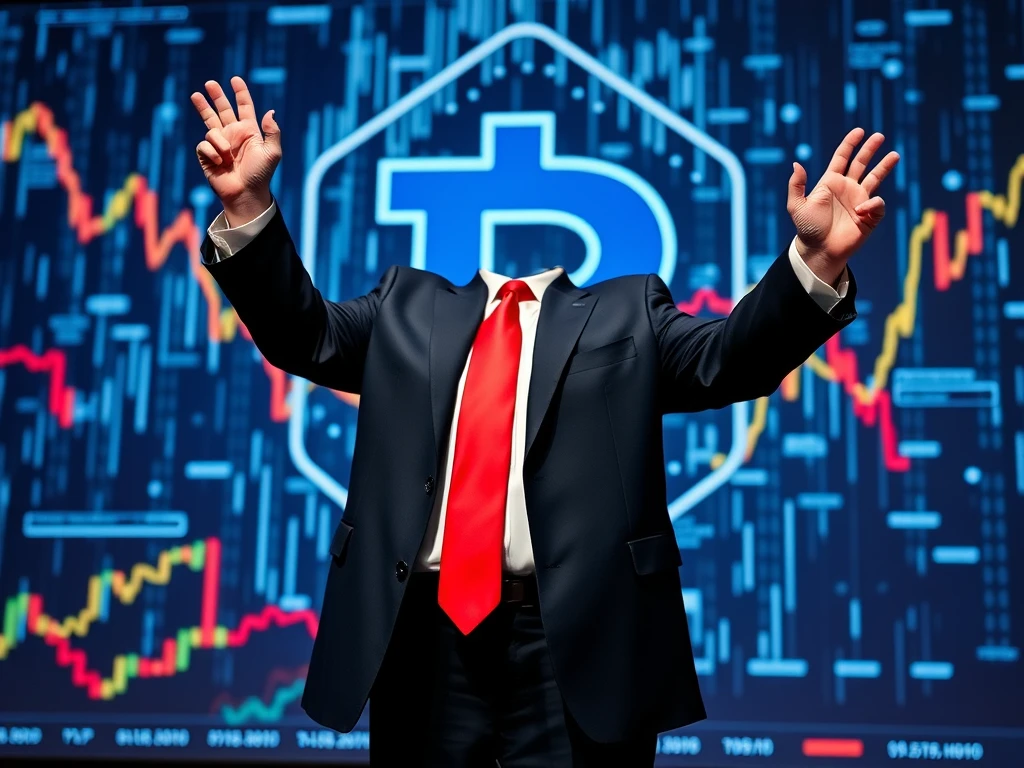Triumphant Trump Veto: IRS DeFi Broker Rule Crushed!

In a stunning move celebrated by the crypto community, former US President Donald Trump has signed a joint Congressional resolution, effectively dismantling a controversial Biden-era rule targeting decentralized finance (DeFi). This landmark decision scraps the mandate that would have forced DeFi protocols to act as brokers for the Internal Revenue Service (IRS), requiring them to report user transaction data. Is this a monumental victory for DeFi, or just the beginning of a complex regulatory landscape? Let’s dive into what this triumphant veto means for the future of crypto.
What Was the Controversial IRS DeFi Rule?
The now-defunct IRS rule aimed to bring DeFi platforms under the same regulatory umbrella as traditional financial brokers. This would have imposed significant obligations on decentralized exchanges (DEXs) and other DeFi protocols, compelling them to:
- Report Gross Proceeds: File reports on the total earnings from cryptocurrency sales occurring on their platforms.
- User Data Disclosure: Collect and submit information identifying users involved in these crypto transactions.
The crypto industry widely criticized this rule, arguing that its broad scope was impractical and fundamentally incompatible with the decentralized nature of DeFi. Critics pointed out the inherent difficulties in applying traditional broker regulations to decentralized, often anonymous, and globally distributed protocols. The core concern revolved around the idea that DeFi protocols, unlike centralized exchanges, are not intermediaries holding user funds and often lack the mechanisms to readily identify and collect user data in the way traditional brokers do.
Why Did Trump Overturn the DeFi Broker Rule?
Several factors likely contributed to President Trump’s decision to sign the resolution.
- Industry Pressure: The crypto industry and advocacy groups mounted significant pressure against the rule, highlighting its potential to stifle innovation and drive DeFi activity overseas.
- Political Opposition: The resolution itself was a bipartisan effort in Congress, indicating broad concern about the rule’s impact.
- Trump’s Stance on Crypto: While his stance has evolved, Trump has generally expressed a more favorable view of cryptocurrency compared to some other political figures, particularly recently as he seeks support from the crypto community. His crypto ‘czar’ David Sacks publicly signaled support for overturning the rule, paving the way for this outcome.
- Economic Growth Argument: Proponents of repealing the rule argued it would foster innovation and economic growth within the US crypto sector, preventing capital and talent from fleeing to more crypto-friendly jurisdictions.
The argument that overly burdensome DeFi regulation could harm the burgeoning crypto industry in the US seems to have resonated, leading to this significant policy reversal.
Impact on Crypto Tax and DeFi Innovation
The immediate impact of overturning the IRS DeFi rule is a collective sigh of relief within the DeFi space. However, the longer-term implications are more nuanced:
Potential Benefits:
- Reduced Regulatory Burden: DeFi protocols are spared from the immediate burden of implementing complex and potentially technically challenging reporting mechanisms.
- Fostered Innovation: The repeal is expected to encourage continued innovation and development within the DeFi sector in the United States, attracting entrepreneurs and investment.
- Clarity (for now): For the time being, there’s a sense of reprieve from what was perceived as an overreaching regulatory attempt, providing a clearer operating environment.
Potential Challenges & Future Outlook:
- Not a Complete Deregulation: This veto doesn’t signify a complete absence of crypto tax obligations. Users are still responsible for reporting and paying taxes on their crypto gains. It primarily removes the broker reporting requirement for DeFi protocols themselves.
- Future Regulatory Scrutiny: While this specific rule is gone, the broader debate about DeFi regulation is far from over. Regulators worldwide are grappling with how to oversee this rapidly evolving space, and future attempts to regulate DeFi are highly probable.
- Need for Clear Guidelines: The industry still needs clear and practical guidelines on crypto taxation and regulation that are tailored to the unique characteristics of decentralized finance, rather than simply applying traditional financial frameworks.
Trump Crypto and the Road Ahead
President Trump’s decision to overturn the IRS DeFi rule marks a significant moment in the ongoing dialogue between the crypto industry and regulators. It signals a potential shift towards a more innovation-friendly approach, at least for the time being. Whether this is a sustained policy direction or a temporary reprieve remains to be seen.
The crypto community will be closely watching for further developments in Trump crypto policies and the broader regulatory landscape. While this veto is a victory, it underscores the ongoing need for proactive engagement and education to shape sensible and effective regulations that foster innovation while addressing legitimate concerns about tax compliance and financial stability.
In Conclusion: A Breath of Fresh Air for DeFi, But Vigilance Remains
Trump’s signing of the resolution to kill the IRS DeFi broker rule is undoubtedly a positive development for the decentralized finance sector. It removes a significant regulatory hurdle and signals a potential willingness to foster crypto innovation within the US. However, it’s crucial to remember that the journey towards clear and balanced decentralized finance regulation is ongoing. The crypto industry must remain vigilant and continue to engage with policymakers to ensure future regulations are practical, innovation-friendly, and truly effective in achieving their intended goals.









